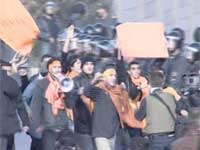
OPENING OF THE POLITICAL SYSTEM DEFINES AZERBAIJAN’S IMPERFECT ELECTIONS
Publication: Eurasia Daily Monitor Volume: 2 Issue: 209
By:

Other than the irregularities that marred the New Azerbaijan Party’s (YAP) clear-cut overall victory, ultimately the salient fact in these parliamentary elections is the opening up of the political system. Unsurprisingly, Azerbaijan’s political system and most players are insufficiently prepared technically, professionally, and (not least) culturally to handle elections of this complexity (see EDM, October 27, 28, November 3, 4, 7).
President Ilham Aliyev has boldly effected this opening from above, with support from elements of the governing establishment and against the inertia, incomprehension, or resistance of other elements. No Muslim nation, save Turkey (after decades of reforms there) has experienced the degree of political openness that Azerbaijan experienced in this parliamentary election campaign in terms of multiplicity of candidacies (baffling not only to outsiders), media access and coverage (oversaturation), precautions against multiple voting (somewhat late but generally effective), massive internal monitoring by opposition and NGOs, detailed international scrutiny, and immediate reporting of returns (television channels reporting the returns, and the challenges to the returns, hour after hour on election night and the day after).
In the wake of the elections, the political-opening process needs to be completed by calling to account the officials involved in falsifying the vote count or tabulation in certain electoral districts. Aliyev has made a commitment in that regard in his October 25 speech and decrees and his election-night televised address of November 7. The Central Electoral Commission has admitted to serious vote-counting and tabulation problems in 10 electoral districts (out of the 125 single-mandate districts). As of today, the CEC has annulled the results in three districts, and ordered recounts in another two; this should be only the beginning of such measures.
According to CEC’s provisional official returns, YAP has won 63 seats in the 125 seat-parliament; small-party and individual independent candidates (many of them pro-government), some 50 seats; and opposition candidates from various parties, up to 10 seats, including four for Musavat and two for the Popular Front that belong to the radical Azadliq (Freedom) bloc.
One major factor, largely overlooked, that almost inexorably works against the opposition is the first-past-the-post system in a single round of balloting in single-mandate electoral districts. In this system, the parliamentary seat for that district goes to the candidate who placed first, even if that candidate garnered less — often indeed far less — than 50% of the votes cast. The opposition is more fragmented than the pro-government camp, and the pro-government candidates tend often to be the front-runners (with majorities or pluralities) at the start of the race. Thus, opposition candidates are likely to divide the protest vote among themselves, and the pro-government candidate wins, with or without an absolute majority of the votes cast.
Some of the opposition candidates’ with the highest profile fought against each other in certain electoral districts: for example, radical opposition Liberal Party leader Lala Shovket-Hajieva against former Communist Party leader and state president, Ayaz Mutalibov of the YES bloc (Shovket-Hajieva was declared winner); Musavat’s newspaper editor Rauf Arifoglu against Islamic Party leader Haji-Aga Nuriev (result unclear); National Independence Party chairman Etibar Mamedov of the YES bloc against his former vice-chairman, Nazim Imanov (both lost to a third candidate).
Such contests also pitted pro-government candidates against each other. For example, nominally independent candidate Elmira Akhundova, official biographer of the late president Heydar Aliyev, was declared the winner against YAP’s official candidate in that district. As a result, YAP’s district electoral commission members are charging fraud and demanding a recount. Such situations were almost inevitable, given the fact that as many as 1,800 candidates competed for as few as 125 parliamentary seats.
The most “quiet, unproblematic” election took place in the Nakhichevan exclave (separated by Armenia and Armenian-occupied territory from the rest of Azerbaijan). Nakhichevan is the last corner of Azerbaijan ruled in the old-fashioned way. Local government leader Vasif Talybov ensured an orderly pro-government vote; no opening of the political system, hence no “irregularities.”
Azadliq and YES have both announced that they regard the elections overall as rigged and demand annulments or recounts in 100 electoral districts. Opposition leaders will take the parliamentary seats that they officially gained, pending a general revision of the results. Musavat and Popular Front leaders, Isa Gambar and Ali Kerimli, declared yesterday that they accept a dialogue with the government “any time”; so does the YES bloc. Within Azadliq, however, Rasul Guliyev’s Democratic Party led in Baku by Sardar Jalal-oglu says that it rejects any dialogue with the authorities.
(ANS TV, Turan, Trend, November 7, 8)




